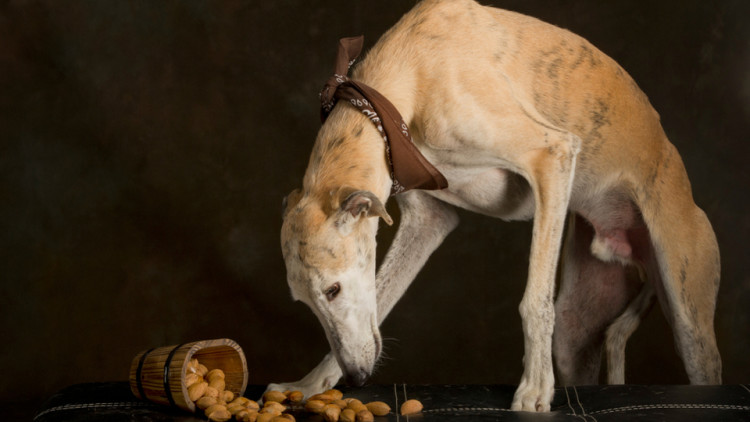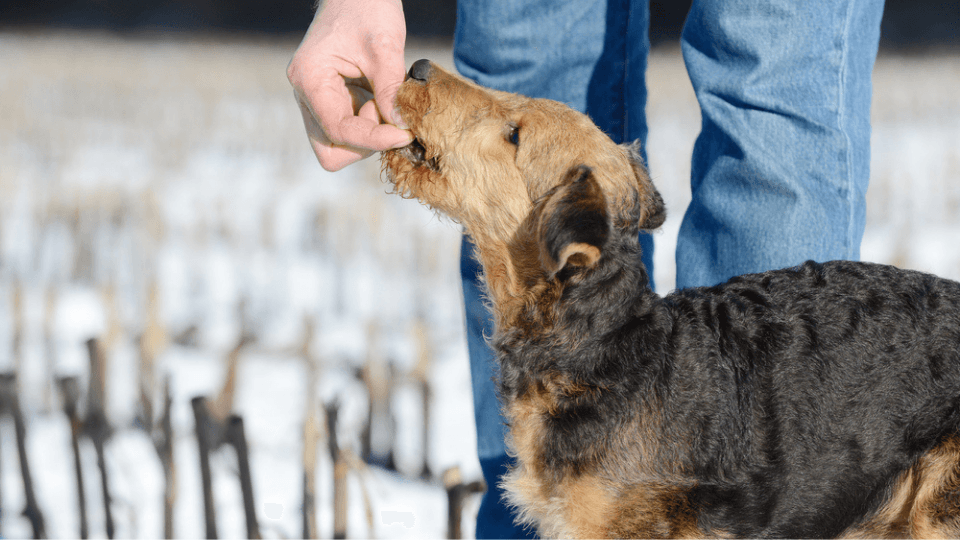Some pet parents love sharing their human snacks with their furry friends, especially when the puppy-dog eyes are so hard to resist. But this isn’t always safe. Chocolate, grapes, raisins, mushrooms, garlic, and onions are just a few of the many human foods that can be toxic to dogs and cats. Feeding these to your pets can have serious and unwanted consequences.
But what about nuts?
These small treats are considered to be healthy, overall, for humans. They are loaded with omega fatty acids, but you need to approach them with caution because they contain a high number of energy-producing calories, some pups are allergic, and many contain toxins.
- Are nuts safe for dogs?
- 3 dog-safe nuts
- Never feed nut shells to your dog
- Avoid coated and processed nuts
- Be cautious of fat content
- Avoid most nuts!(See this list)
- Dog-safe takeaways
So, Are Nuts Safe for Dogs?
While some nuts are safe to give to your dog, there are similar factors to consider. Dogs are much smaller than people, in most cases, which means that a few extra calories can have a significant impact on your dog’s weight.
And, while nut allergies are less common and less severe in dogs, they do still exist.
There’s also the added concern of nut toxicity, which exists in certain nuts, and the fact that the shape and size of some nuts can make them a choking hazard for your pup.
With all of these factors in mind, we have listed the nuts that are safe to feed to your dog, although there may be some cautionary notes to accompany them.
3 Dog-Safe Nuts
In moderation, the following nuts may be considered safe for your dog:
1. Peanuts
Technically, peanuts are legumes because they grow underground, so they’re not “nuts” per se. Though they are an excellent source of protein (any most people think of them as nuts). As such, peanuts are safe to give to dogs, but they are high in fat so should be fed sparingly.
Peanut butter is a popular treat for dogs. It is sticky and dogs tend to love the taste. If you’ve ever owned a Kong and needed a way to keep dry kibble inside, peanut butter may have been your go-to solution. However, a single tablespoon of smooth peanut butter contains the full daily fat allowance for a 42-pound dog. Also, some peanut butter brands contain toxic ingrediants like xylitol - and dogs with pancreatitis or kidney problems should stear clear. Feed cautiously, feed sparingly, and look for ways to dilute peanut butter content when giving treats like Kongs by mixing it with lower fat favorites like canned pumpkin or low fat yogurt.
2. Cashews
Cashews are soft and a reasonable size. As long as they are shelled and you feed in moderation, these are considered safe. However, most packaged cashews are salted, so look for unsalted and unprocessed varieties.
Just make sure there a no shells as they contain urushiol, a toxin that causes itchey skin reactions.
3. Hazelnuts
As long as the hazelnuts are unsalted, uncoated, and in moderation, you pup shouldn't have any health issues. However, be careful as small dogs can easily choke and larger dogs will likely swallow them whole in which the nut can get stuck in their instestines.
NEVER Feed Nut Shells To Your Dog
Never feed your dog the shells of nuts. These may be toxic and they all pose a choking threat. Their size and texture also mean that they can cause tears in the digestive tract and other injuries while making their way through their body. If you feed your dog any nuts, ensure that they’re shelled first.
AVOID Coated and Processed Nuts
Most packaged nuts are salted. You should always limit the amount of salt you give to your dog because it causes dehydration. It doesn’t take too many salted peanuts before it can harm your furry friend. Many packets also contain additional coatings. These can include toxic ingredients like garlic or onion powder, and one surprising ingredient is xylitol. Xylitol is a sugar substitute and is another ingredient that is toxic to dogs. Always opt for raw, plain nut varieties if you are sharing with your pup, or opt for a different dog-friendly treat instead.
BE CAUTIOUS Of Fat Content
A final word of caution relates to the fat content of nuts. Foods with a high fat content can cause pancreatitis in dogs. Pancreatitis is a very painful and potentially life-threatening disease that will require veterinarian assistance. If you do want to feed any of the nuts below to your dog, only give them one or two and avoid those that have exceedingly high fat content.
There Are Many Nuts You Should Avoid
- Macadamia: A single macadamia nut can seriously harm your dog's health.
- Almonds: Dogs cannot properly digest the proteins present these (and many other nuts), and aflatoxins are poisonous substances found in crops and nuts, like almonds, pistachios, and Brazil nuts.
- Pecans: In addition to aflatoxin, pecans also contain juglone, a toxin that can be harmful to dogs and horses.
- Pistachios: Another nut known to have aflatoxin.
- Walnuts: Black walnuts, English walnuts, and Japanese walnuts can contain fungi called tremorgenic mycotoxins which cause vomiting, tremors, and seizures.

Dog-Safe Takeaways
It is only natural to want to share the treats and food we love with our dogs, but we have to make sure that we only give those foods that are non-toxic and otherwise safe for canine consumption. Nuts, generally, pose sevral known hazards. Some, such as the black walnut or macadamia, are especially toxic. Most nuts can pose a choking hazard so need to be prepared first. And all shells need to be removed before feeding to your dog, always. Before you feed your dog anything new - check with your vet to make sure it's safe.

